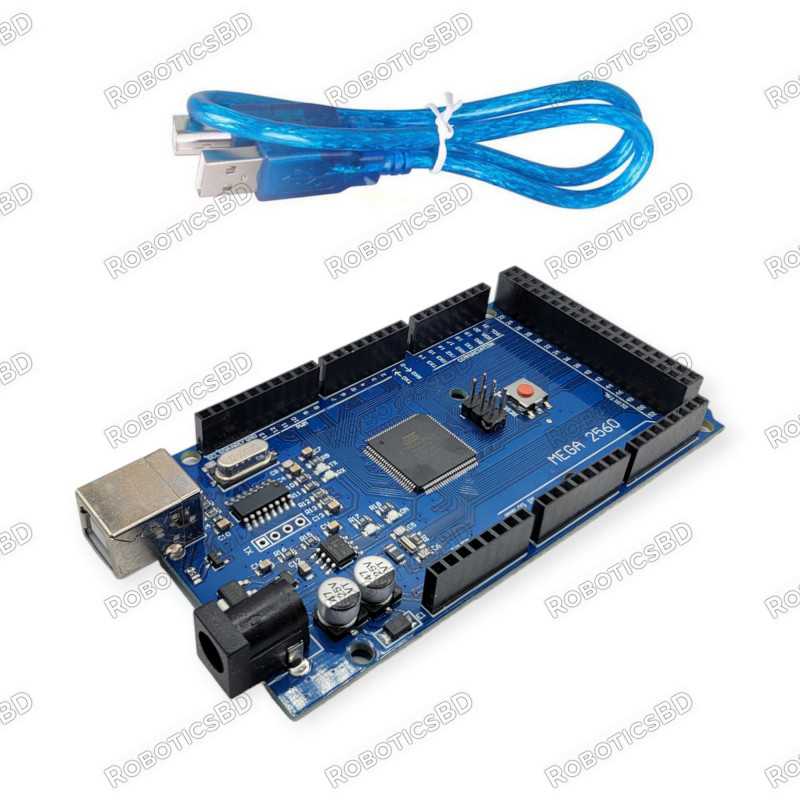
Reference: RBD-0155
Banner





 Security policy
Security policy
(edit with the Customer Reassurance module)
 Delivery policy
Delivery policy
(edit with the Customer Reassurance module)
 Return policy
Return policy
(edit with the Customer Reassurance module)
The ATmel MCU ATMEGA16U2 MEGA 2560 R3 Improved Version CH340G Board is a micro-controller board base on the ATmega2560. It has a USB host interface to connect with Android based phones, base on the MAX3421e IC. RoboticsBD
It has 54 digital input/output pins (of which 15 can be used as PWM outputs); 16 analog inputs, 4 UARTs (hardware serial ports), a 16 MHz crystal oscillator; a USB connection, a power jack, an ICSP header, and a reset button. The MEGA ADK is base on the Mega 2560. Similar to the Mega 2560 and Uno, it features an ATmega8U2 program as a USB-to-serial converter. Revision 3 of the Mega ADK board has a resistor pulling the 8U2 HWB line to ground, making it easier to put into DFU(Device Firmware Upgrade) mode. RoboticsBD
The board has the following new features:
The Mega Arduino R3 Android Accessory Development Kit (ADK) can be power via the USB connection or with an external power supply. The power source is select automatically. External (non-USB) power can come either from an AC-to-DC adapter (wall-wart) or battery. The adapter can be connected by plugging a 2.1mm center-positive plug into the board’s power jack. RoboticsBD
Leads from a battery can be inserted in the GND and Vin pin headers of the POWER connector. Because the Mega R3 Android Accessory Development Kit (ADK) is a USB Host, the phone will attempt to draw power from it when it needs to charge. When the ADK is power over USB, 500mA total is available for the phone and board.
Because Atmel is moving more and more of their production capacity to surface mount ICs, the DIP packaged ATmega is becoming more and more difficult to get. The board is identical to the PTH version of the Uno, but you won't be able to remove the ATmega without some hot-air. This change shouldn't affect most users. Besides - when was the last time you managed to destroy an ATmega and needed to repair an Arduino board? Those things are nearly indestructible. Featured By RoboticsBD.
Product Images are shown for illustrative purposes only and may differ from the actual product.
RoboticsBD RoboticsBD RoboticsBD RoboticsBD RoboticsBD RoboticsBD RoboticsBD RoboticsBD RoboticsBD RoboticsBD
*Please note that the boards have a CH340G USB-Controller rather than ATmega16 like regular MEGA2560. They are recognized on Linux without any additional drivers. Mac OS and Windows users may need to install an additional driver. RoboticsBD
RoboticsBD RoboticsBD RoboticsBD RoboticsBD RoboticsBD RoboticsBD RoboticsBD RoboticsBD RoboticsBD RoboticsBD
| General Specification | |
| Input Voltage (recommended) | 7-12V |
| Digital I/O Pins | 54 (of which 15 provide PWM output) |
| Analog Input Pins | 16 |
| Flash Memory | 256 KB of which 8 KB used by boot-loader. |
| Microcontroller | ATmega2560 |
| Country of Origin/Manufacture | China |
| PWM Output Pins | 14 |
| Dimensions (mm) LxWxH | 110 x 53 x 15 mm. |
| Weight (gm) | 35 |
| Shipment Weight | 0.037 kg |
| Shipment Dimensions | 10.5 × 5.5 × 1.5 cm |
Please allow 5% measuring deviation due to manual measurement.
RoboticsBD RoboticsBD RoboticsBD RoboticsBD RoboticsBD RoboticsBD RoboticsBD RoboticsBD RoboticsBD RoboticsBD
Memory
The Mega R3 Android Accessory Development Kit (ADK) has 256 KB of flash memory for storing code (of which 8 KB is used for the bootloader); 8 KB of SRAM and 4 KB of EEPROM (which can be read and written with the EEPROM library).
Input and Output
Each of the 50 digital pins on the Mega R3 Android Accessory Development Kit (ADK) can be used as an input or output; using pinMode(), digitalWrite(), and digitalRead() functions. They operate at 5 volts. Each pin can provide or receive a maximum of 40 mA . has an internal pull-up resistor (disconnect by default) of 20-50 kOhm. In addition, some pins have specialized functions:
MAX3421E
The Mega R3 Android Accessory Development Kit (ADK) has 16 analog inputs, each of which provides 10 bits of resolution (i.e. 1024 different values). By default, they measure from ground to 5 volts, though is it possible to change the upper end of their range using the AREF pin and analogReference() function. There are a couple of other pins on the board:
Communication
The Mega R3 Android Accessory Development Kit (ADK) has a number of facilities for communicating with a computer, another Arduino, or other micro-controllers. The ATmega2560 provides four hardware UARTs for TTL (5V) serial communication. An ATmega8U2 on the board channels one of these over USB and provides a virtual com port to software on the computer (Windows machines will need a .inf file, but OSX and Linux machines will recognize the board as a COM port automatically. The Arduino software includes a serial monitor which allows simple textual data to be sent to and from the board.
The RX and TX LEDs on the board will flash when data is being transmitted via the ATmega8U2/16U2 chip and USB connection to the computer (but not for serial communication on pins 0 and 1). A Software-serial library allows for serial communication on any of the MEGA ADK’s digital pins. The ATmega2560 also supports TWI and SPI communication. The Arduino software includes a Wire library to simplify the use of the TWI bus, see the Wire library for details. For SPI communication, use the SPI library.
The USB host interface given by MAX3421E IC allows the Arduino MEGA ADK to connect and interact to any type of device that has a USB port. For example, allows you to interact with many types of phones, controlling Canon cameras, interfacing with keyboard, mouse and games controllers as Wiimote and PS3.
Programming
The Mega R3 Android Accessory Development Kit (ADK) can be the program with the Arduino software (download). For details, see the reference and tutorials. The ATmega2560 on the MEGA ADK comes preburn with a boot-loader (the same on Mega 2560) that allows you to upload new code to it without the use of an external hardware programmer. It communicates using the original STK500v2 protocol (reference, C header files).
You can also bypass the bootloader and program the microcontroller through the ICSP (In-Circuit Serial Programming) header using Arduino ISP or similar; see these instructions for details. The ATmega8U2 firmware source code is available in the Arduino repository. The ATmega8U2 is load with a DFU bootloader, which can be activated by:
Automatic (Software) Reset
Rather then requiring a physical press of the reset button before an upload, the Arduino MEGA ADK is designed in a way that allows it to be reset by software running on a connected computer. One of the hardware flow control lines (DTR) of the ATmega8U2 is connected to the reset line of the ATmega2560 via a 100 nano-farad capacitor. When this line is asserted (taken low), the reset line drops long enough to reset the chip. The Arduino software uses this capability to allow you to upload code by simply pressing the upload button in the Arduino environment.
This means that the boot-loader can have a shorter timeout, as the lowering of DTR can be well-coordinated with the start of the upload. This setup has other implications. When the MEGA ADK is connected to either a computer running Mac OS X or Linux, it resets each time a connection is made to it from software (via USB). For the following half-second or so, the bootloader is running on the MEGA ADK. While it is programmed to ignore malformed data (i.e. anything besides an upload of new code), it will intercept the first few bytes of data sent to the board after a connection is open.
If a sketch running on the board receives one-time configuration or other data when it first starts; make sure that the software with which it communicates waits for a second after opening the connection and before sending this data. The MEGA ADK contains a trace that can be cut to disable the auto-reset. The pads on either side of the trace can be solder together to re-enable it. It’s the label “RESET-EN”. You may also be able to disable the auto-reset by connecting a 110-ohm resistor from 5V to the reset line; see this forum thread for details.
USB Over-current Protection
The Mega R3 Android Accessory Development Kit (ADK) has a resettable polyfuse that protects your computer’s USB ports from shorts and overcurrent. Although most computers provide their own internal protection, the fuse provides an extra layer of protection. If more than 500 mA is applied to the USB port. The fuse will automatically break the connection until the short or overload is removed.
Physical Characteristics and Shield Compatibility
The maximum length and width of the Mega R3 Android Accessory Development Kit (ADK) PCB are 4 and 2.1 inches respectively; with the USB connector and power jack extending beyond the former dimension. Three screw holes allow the board to be attached to a surface or case. Note that the distance between digital pins 7 and 8 is 160 mil (0.16″); not an even multiple of the 100 mil spacing of the other pins. The MEGA ADK is designed to be compatible with most shields design for the Uno, Diecimila or Duemilanove.
Digital pins 0 to 13 (and the adjacent AREF and GND pins), analog inputs 0 to 5; the power header, and ICSP header are all in equivalent locations. Further, the main UART (serial port) is located on the same pins (0 and 1); as are external interrupts 0 and 1 (pins 2 and 3 respectively). SPI is available through the ICSP header on both the MEGA ADK and Duemilanove / Diecimila.
Please note that I2C is not located on the same pins on the MEGA ADK (20 and 21); as the Duemilanove / Diecimila (analog inputs 4 and 5).
1 x Arduino Mega 2560 CH340
1 x Cable for Arduino Mega 2560.
RoboticsBD RoboticsBD RoboticsBD RoboticsBD RoboticsBD RoboticsBD RoboticsBD RoboticsBD RoboticsBD RoboticsBD
RoboticsBD RoboticsBD RoboticsBD RoboticsBD RoboticsBD RoboticsBD RoboticsBD RoboticsBD RoboticsBD RoboticsBD
Specific References
Your review appreciation cannot be sent
Report comment
Report sent
Your report cannot be sent
Write your review
Review sent
Your review cannot be sent
Reference: RBD-0155
Reference: RBD-1216
Reference: RBD-1138
Reference: RBD-2288
Reference: RBD-1133
Reference: RBD-0658
Reference: RBD-2267
Reference: RBD-2344
Reference: RBD-1407
Reference: RBD-2679
Reference: RBD-1684
Reference: RBD-2569
Reference: RBD-0948
Reference: RBD-1821
Reference: RBD-2413
Reference: RBD-2764
Reference: RBD-0009
Reference: RBD-0094
Reference: RBD-0436
Reference: RBD-1214

check_circle
check_circle